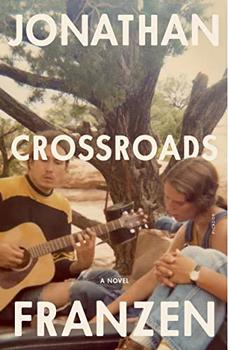Summary | Excerpt | Reading Guide | Reviews | Beyond the Book | Readalikes | Genres & Themes | Author Bio

A Key to All Mythologies #1
by Jonathan Franzen
On his office walls were posters of Charlie Parker and his sax, Dylan Thomas and his fag; a smaller picture of Paul Robeson framed alongside a handbill for Robeson's appearance at the Judson Church in 1952; Russ's diploma from the Biblical Seminary in New York; and a blown-up photo of him and two Navajo friends in Arizona, in 1946. Ten years ago, when he'd assumed the associate ministry in New Prospect, these artfully chosen assertions of identity had resonated with the teenagers whose development in Christ had been part of his brief. But to the kids who now thronged the church's hallways in their bell-bottoms and bib overalls, their bandannas, they signified only obsolescence. The office of Rick Ambrose, him of the stringy black hair and the glistening black Fu Manchu, had a kindergarten feel to it, the walls and shelves bedecked with the crudely painted effusions of his young disciples, the special meaningful rocks and bleached bones and wildflower necklaces they'd given him, the silk-screened posters for fundraising concerts with no discernible relation to any religion Russ recognized. After his humiliation, he'd hidden in his office and ached amid the fading totems of a youth that no one but his wife found interesting anymore. And Marion didn't count, because it was Marion who'd impelled him to New York, Marion who'd turned him on to Parker and Thomas and Robeson, Marion who'd thrilled to his stories of the Navajos and urged him to heed his calling to the ministry. Marion was inseparable from an identity that had proved to be humiliating. It had taken Frances Cottrell to redeem it.
"My God, is this you?" she'd said on her first visit to his office, the previous summer, as she studied the photo from the Navajo reservation. "You look like a young Charlton Heston."
She'd come to Russ for grief counseling, another part of his brief and not his favorite, since his own most grievous loss to date was of his boyhood dog, Skipper. He'd been relieved to hear that Frances's worst complaint, a year after her husband's fiery death in Texas, was a sense of emptiness. At his suggestion that she join one of the First Reformed women's circles, she flicked her hand. "I'm not going to coffee with the ladies," she said. "I know I've got a boy starting high school, but I'm only thirty-six." Indeed, she was sagless, pouchless, flabless, lineless, an apparition of vitality in a snug paisley sleeveless dress, her hair naturally blond and boyishly short, her hands boyishly small and square. It was obvious to Russ that she'd be remarried soon enough—that the emptiness she felt was probably little more than the absence of a husband—but he remembered his anger when his mother had asked him, too soon after Skipper's passing, whether he might like another dog.
There was, he told Frances, one particular women's circle, different from the others, guided by Russ himself, that worked with members of First Reformed's inner-city partner church, the Community of God. "The ladies don't coffee," he said. "We paint houses, clear brush, haul trash. Take the elderly to their appointments, help kids with their homework. We do it every other Tuesday, all day. And, let me tell you, I look forward to those Tuesdays. It's one of the paradoxes of our faith—the more you give to the less fortunate, the fuller you feel in Christ."
"You say his name so easily," Frances said. "I've been going to Sunday service for three months, and I'm still waiting to feel something."
"Not even my own sermons have moved you."
Excerpted from Crossroads by Jonathan Franzen. Copyright © 2021 by Jonathan Franzen. Excerpted by permission of Farrar, Straus & Giroux. All rights reserved. No part of this excerpt may be reproduced or reprinted without permission in writing from the publisher.
If there is anything more dangerous to the life of the mind than having no independent commitment to ideas...
Click Here to find out who said this, as well as discovering other famous literary quotes!
Your guide toexceptional books
BookBrowse seeks out and recommends the best in contemporary fiction and nonfiction—books that not only engage and entertain but also deepen our understanding of ourselves and the world around us.